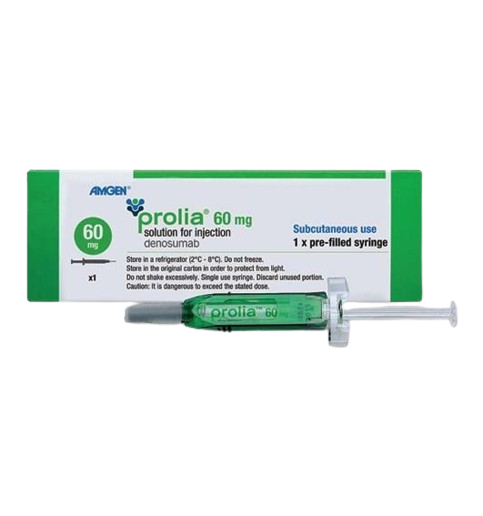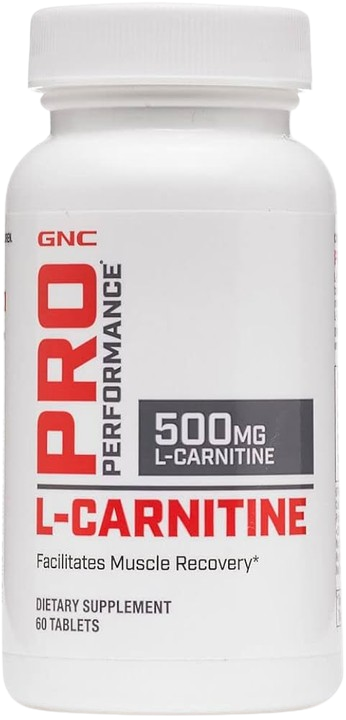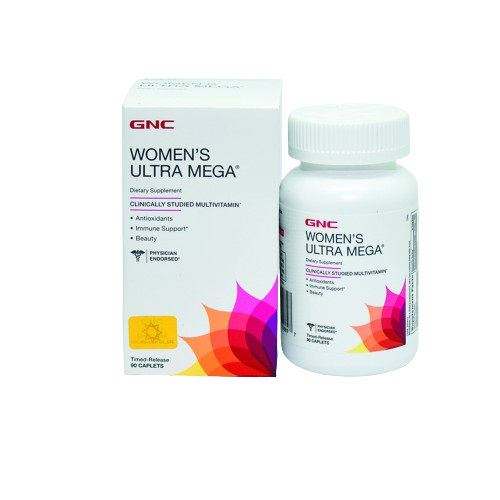Prolia (denosumab) 60mg Injection Imported in pakistan
Overview
Prolia is a medication containing denosumab, primarily used for the treatment of osteoporosis in postmenopausal women and men at increased risk of fractures. It is available in Pakistan as an imported product.
Pricing
- The price of Prolia 60mg injection varies by vendor:
- Online Pharmacy: Rs. 40,000.
- Dawailo: Rs. 35,000 (subject to change based on dollar exchange rate).
Manufacturer
- Brand: Prolia
- Manufacturer: Amgen Inc.
Dosage and Administration
- The recommended dosage is one pre-filled syringe of 60 mg administered subcutaneously once every six months.
Indications
- Prolia is indicated for:
- Treatment of osteoporosis in postmenopausal women.
- Treatment of osteoporosis in men at increased risk of fractures.
Original price was: ₨50,000.00.₨45,000.00Current price is: ₨45,000.00.
Description
Overview
Prolia is a medication containing denosumab, primarily used for the treatment of osteoporosis in postmenopausal women and men at increased risk of fractures. It is available in Pakistan as an imported product.
Pricing
- The price of Prolia 60mg injection varies by vendor:
- Online Pharmacy: Rs. 40,000.
- Dawailo: Rs. 35,000 (subject to change based on dollar exchange rate).
Manufacturer
- Brand: Prolia
- Manufacturer: Amgen Inc.
Dosage and Administration
- The recommended dosage is one pre-filled syringe of 60 mg administered subcutaneously once every six months.
Indications
- Prolia is indicated for:
- Treatment of osteoporosis in postmenopausal women.
- Treatment of osteoporosis in men at increased risk of fractures.
-
Key Benefits of Prolia (Denosumab)
- Increased Bone Density: Prolia effectively increases bone mass and strength by inhibiting the breakdown of bone tissue, which helps improve overall bone density.
- Fracture Risk Reduction: Clinical studies demonstrate that Prolia significantly reduces the risk of vertebral, non-vertebral, and hip fractures in individuals with osteoporosis. It has shown a relative risk reduction of up to 71% for vertebral fractures over a three-year period.
- Convenient Administration: Prolia is administered as a subcutaneous injection once every six months, making it easier for patients compared to daily or weekly oral medications.
- Biologic Mechanism: As a monoclonal antibody, Prolia targets the RANK ligand protein, which is crucial in the formation and activity of osteoclasts (cells that break down bone), thus providing a targeted approach to treating osteoporosis.
- Support for Cancer Patients: Prolia is also indicated for increasing bone mass in men with osteoporosis at high risk for fracture and for those undergoing hormone ablation therapy for prostate or breast cancer.
Key Ingredients of Prolia
- Active Ingredient: Denosumab (60 mg per injection). Denosumab is a monoclonal antibody that specifically binds to the RANK ligand, inhibiting its action and thereby reducing bone resorption.
- Excipients: The specific formulation may include stabilizers and preservatives, but the detailed list of excipients is typically provided in the product’s summary of characteristics or package insert.
-
Mechanism of Action of Prolia (Denosumab)
Prolia (denosumab) is a fully human monoclonal antibody that plays a crucial role in the management of osteoporosis by targeting the RANK ligand (RANKL), a key protein involved in bone metabolism.
Key Mechanisms:
- Inhibition of RANKL: Prolia binds specifically to RANKL, preventing it from interacting with its receptor, RANK, on the surface of osteoclasts and their precursors. This interaction is essential for the formation, function, and survival of osteoclasts, the cells responsible for bone resorption.
- Reduction in Osteoclast Activity: By inhibiting the RANKL/RANK signaling pathway, Prolia effectively decreases the formation and activity of osteoclasts. This leads to a reduction in bone resorption, which is the process where bone is broken down and its minerals released into the bloodstream.
- Increase in Bone Mass and Strength: The inhibition of osteoclasts results in decreased bone loss and an increase in bone mineral density (BMD). This strengthening of both cortical and trabecular bone helps reduce the risk of fractures in individuals with osteoporosis.
- Rapid Action: Prolia begins to work shortly after administration, with significant effects on bone turnover markers observed within days. Maximum effects on bone density are typically reached within one month of the injection.

 Human monoclonal antibody used for the treatment of various bone conditionsMoreUsesTreatment of osteoporosis, treatment-induced bone loss, bone metastases, and giant cell tumor of boneContraindicationsNot to be used by individuals with low blood calcium levelsCommon Side EffectsJoint and muscle pain, increased risk of infections, hypocalcemia
Human monoclonal antibody used for the treatment of various bone conditionsMoreUsesTreatment of osteoporosis, treatment-induced bone loss, bone metastases, and giant cell tumor of boneContraindicationsNot to be used by individuals with low blood calcium levelsCommon Side EffectsJoint and muscle pain, increased risk of infections, hypocalcemiaChemical Structure of Denosumab
Denosumab, the active ingredient in Prolia, is a fully human monoclonal antibody with an approximate molecular weight of 147 kDa. Its structural formula is as follows:Denosumab is a heterotetramer consisting of:
- 2 heavy chains of the gamma 2 subclass (447 amino acids per chain)
- 2 light chains of the kappa subclass (215 amino acids per chain)
The heavy and light chains are linked together by disulfide bonds. Denosumab contains 36 total cysteine residues, which are involved in both intrachain and interchain disulfide bonds.Denosumab is produced in genetically engineered mammalian (Chinese hamster ovary) cells and is N-glycosylated at a single site in each heavy chain (Asn299). The N-linked structures consist of biantennal, core-fucosylated species with galactose and sialic acid heterogeneity.
Key Precautions for Prolia (Denosumab)
- Serious Infections: Patients should be monitored for signs of infections, including cellulitis. Immediate medical attention is required if any symptoms develop.
- Dermatologic Reactions: Patients should seek prompt medical help if they experience severe skin reactions, such as dermatitis, rashes, or eczema.
- Musculoskeletal Pain: Severe bone, joint, or muscle pain has been reported. Patients should inform their healthcare provider if they experience significant pain.
- Pregnancy and Nursing: Prolia is contraindicated during pregnancy and breastfeeding. Women of reproductive potential should use effective contraception during treatment and for at least five months after the last dose.
- Calcium Levels: Patients should be monitored for hypocalcemia (low calcium levels). It is recommended to maintain adequate calcium and vitamin D intake while on Prolia.
- Discontinuation Risks: Stopping Prolia treatment can lead to multiple vertebral fractures. Patients should not interrupt therapy without consulting their physician.
- Administration: Prolia should be administered by a healthcare professional, and patients should adhere to the scheduled injection every six months.
Dietary Restrictions
While there are no specific dietary restrictions associated with Prolia, it is essential to:
- Calcium and Vitamin D Supplementation: Patients are advised to take at least 1000 mg of calcium and 400 IU of vitamin D daily to support bone health while on Prolia. This supplementation is crucial for preventing hypocalcemia.
- Balanced Diet: A well-balanced diet rich in calcium (found in dairy products, leafy greens, and fortified foods) and vitamin D (from sunlight exposure and foods such as fatty fish and fortified products) can help enhance the effectiveness of the treatment.
Foods to Consider
- Calcium-Rich Foods: Include dairy products (milk, cheese, yogurt), leafy green vegetables (kale, broccoli), and fortified foods (orange juice, cereals) to ensure sufficient calcium levels.
- Vitamin D Sources: Fatty fish (salmon, mackerel), egg yolks, and fortified foods can help maintain adequate vitamin D levels, which is vital for calcium absorption.
Foods to Avoid or Limit
While there are no direct food interactions with Prolia, it is advisable to limit:
- High-Sodium Foods: Excessive sodium can lead to calcium loss in urine, so it may be beneficial to limit processed foods high in salt.
- Caffeine: High caffeine intake can interfere with calcium absorption and may contribute to bone loss, so moderation is recommended.
General Recommendations
- Hydration: Stay well-hydrated, as adequate fluid intake supports overall health.
- Balanced Diet: A well-rounded diet that supports bone health is crucial.
Prolia (denosumab) can interact with several medications, particularly:
Corticosteroids
Prolia can interact with corticosteroids (also called steroids) used to treat inflammation, such as:
- hydrocortisone injection (Solu-Cortef)
- hydrocortisone tablet (Cortef)
- methylprednisolone (Medrone, Solu-Medrone)
Taking Prolia with corticosteroids may increase your risk of infections.
Immunosuppressants
Prolia can interact with immunosuppressant drugs that weaken the immune system, such as:
- adalimumab (Humira)
- cyclosporine (Neoral)
- infliximab (Remicade)
Taking Prolia with immunosuppressants may further increase your risk of infections.
Other Interactions
Prolia has over 280 moderate interactions with other medications. Some of the most common include:
- Aspirin
- Atorvastatin
- Gabapentin
- Levothyroxine
- Omeprazole
- Prednisone
- Vitamin D3
Medications to Avoid
- Corticosteroids:
- Medications like prednisone can increase the risk of infections when used with Prolia. Patients should discuss their corticosteroid use with their healthcare provider.
- Calcimimetics:
- Drugs such as cinacalcet, which are used to treat conditions related to high calcium levels, may worsen the risk of hypocalcemia when taken with Prolia.
- Immunosuppressants:
- Medications that suppress the immune system, such as methotrexate and cyclosporine, may increase the risk of infections when combined with Prolia.
- Other Denosumab Products:
- Prolia should not be used in conjunction with other denosumab products like Xgeva, as they contain the same active ingredient and can lead to an overdose.
General Recommendations
- Always inform your healthcare provider about all prescription and over-the-counter medications, as well as any vitamins, minerals, or herbal supplements you are taking.
- Regular monitoring for side effects and interactions is essential, especially for those on multiple medications.
Recommended Dosage
- Dosage: Prolia is administered as a single subcutaneous injection of 60 mg.
- Frequency: The injection is given once every 6 months.
- Administration: Prolia should be administered by a healthcare professional, but after proper training, patients may self-inject if deemed appropriate by their physician.
Storage
- Temperature: Prolia should be stored in a refrigerator at temperatures between 2°C to 8°C (36°F to 46°F).
- Room Temperature: Prior to administration, Prolia can be allowed to reach room temperature (up to 25°C or 77°F) for about 15 to 30 minutes. Do not use if the solution is cloudy or discolored.
Missed Dose
- If a dose is missed, it should be administered as soon as possible. The next dose should be scheduled 6 months from the date of the last injection.
Reviews and Patient Feedback
While specific reviews were not included in the search results, general feedback on Prolia includes:
- Effectiveness: Many patients report positive outcomes in increasing bone density and reducing fracture risk.
- Side Effects: Common side effects noted by users include joint pain, back pain, and skin reactions. Some patients have expressed concerns about the risk of infections.
- Convenience: The biannual injection schedule is often appreciated for its convenience compared to daily or weekly medications.
Prolia (denosumab) can be used in conjunction with certain cancer treatments to help manage bone loss and reduce fracture risk. Here are the key points:
Prostate Cancer
- Prolia is indicated to treat bone loss in men receiving androgen deprivation therapy (ADT) for nonmetastatic prostate cancer.
- In a 3-year study, 731 men received Prolia every 6 months along with at least 1000 mg calcium and 400 IU vitamin D daily.
Breast Cancer
- Prolia is approved to increase bone mass in women receiving adjuvant aromatase inhibitor therapy for breast cancer.
- A 2-year study evaluated Prolia in 129 postmenopausal women with nonmetastatic breast cancer receiving aromatase inhibitors, along with calcium and vitamin D supplements.
Safety Considerations
- The incidence of serious adverse events was higher in the Prolia groups compared to placebo in both the prostate cancer (34.6% vs 30.6%) and breast cancer (14.7% vs 9.2%) studies.
- Patients should be monitored for signs of infections, dermatologic reactions, and musculoskeletal pain while on Prolia.
- Prolia should not be used in pregnant women or those with hypocalcemia.









Reviews
There are no reviews yet.